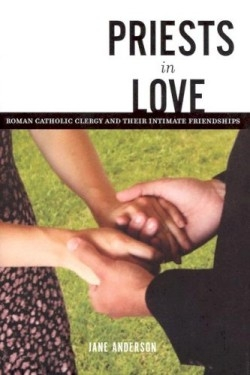
Priests in Love
Catholic Clergy and Their Intimate Friendships
“There is a story that moves beyond negativity and mere titillation,” writes the author, who holds a Ph.D. in anthropology. “That story belongs to priests who love their friends and treasure the priesthood. In caring for both, they are attempting to find a pathway towards a happier future, not just for themselves but also for the church and the world. This book records some elements of this venture.”
This book is a collection of the stories of more than fifty priests who developed intimate connections, despite papal decrees forbidding such relationships and the church’s attempts to suppress them. The stories of these men are poignant. Anderson began research for the book in 1995 because she was moved by the plight of successive short-term priests in her rural Australian parish. She felt that compulsory celibacy contributed to the collapse of these dedicated clerics. Through correspondence and personal interviews over a number of years, she developed these stories.
Anderson relates two stories—one of a priest who hanged himself and another who claims that he could not survive without his special friend, Elizabeth—to show how the Church is “killing priests because we equate the present exclusive, male, celibate, clerical paradigm with the essence of priesthood.”
Father Luke, in his story, is angrily dismissive of celibacy as a tradition, pointing out that the Church did not burn other Christians until about the time that celibacy became mandatory in the twelfth century.
The author uses the words of Father David to summarize her book: “Sexual activity is not the problem. The real problem is secrecy. Over the centuries this wedding of institutional inflexibility with private licence has created an entire culture of secrecy, duplicity and fear that has ended up punishing those who tell the truth and rewarding those who defend the teachings, structures and deceits that keep the system together.” The author goes on to explain: “As a result, Father David and other priests feel locked into a corrupt system.”
Anderson’s book is a sympathetic interpretation of the stories of priests injured in the battles over celibacy in the priesthood and a worthwhile read for anyone interested in the topic. With a helpful appendix providing website addresses of several reform and support groups, the book is well footnoted with both church and secular academic sources, but it reads like a moving novel rather than a sociological treatise. Those looking for a neutral academic treatment of the subject would be better served looking elsewhere.
Disclosure: This article is not an endorsement, but a review. The publisher of this book provided free copies of the book to have their book reviewed by a professional reviewer. No fee was paid by the publisher for this review. Foreword Reviews only recommends books that we love. Foreword Magazine, Inc. is disclosing this in accordance with the Federal Trade Commission’s 16 CFR, Part 255.
